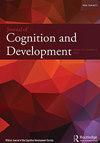积极的未来预期:当充满希望的思考有助于儿童的幸福
IF 1.6
2区 心理学
Q3 PSYCHOLOGY, DEVELOPMENTAL
引用次数: 0
摘要
本研究探讨了儿童对未来的积极期望,特别是希望,它包括代理思维,即认为自己有能力实现目标,以及路径思维,即认为自己有能力找到实现预期目标的方法。在美国进行了两项研究(n = 82),以儿童的自我报告和父母对孩子的报告为基础,研究代理思维和路径思维在儿童特质和状态幸福中的作用。在研究1中,正常发育的儿童(年龄10.21岁)和他们的父母(年龄43.84岁)完成了希望和幸福的测量。研究2扩展了研究1,纳入了患有慢性健康状况的儿童(年龄为11.14岁)及其父母(年龄为43.48岁)的不同样本。在研究1中,通过回归分析发现,儿童代理思维的自我报告对儿童的特质和状态幸福有预测作用,p < 0.05。而在研究2中,回归分析显示儿童的路径思维自我报告可以预测儿童的特质幸福自我报告,p < 0.001。此外,总的来说,路径思维、代理思维和儿童年龄预测儿童的状态幸福,p = 0.025。在这两项研究中,父母对孩子的希望的报告并不能显著地预测孩子的幸福。父母对孩子的希望和幸福的看法与孩子自我报告的水平之间也没有联系。这些发现阐明了希望的认知方面,它促进了童年的幸福,并促进了对美国儿童幸福决定因素的理解本文章由计算机程序翻译,如有差异,请以英文原文为准。
Positive Future Expectancies: When Hopeful Thinking Contributes to Happiness in Children
ABSTRACT This research investigates positive future expectancies, particularly hope in children, which is comprised of agency thinking, perceiving oneself as capable of achieving goals, and pathways thinking, perceiving oneself as capable of discovering methods toward the desired goals. Two studies (n = 82) were conducted in the United States to examine the role of agency and pathways thinking in children’s trait and state happiness based on children’s self-reports and their parents reports of their children. In Study 1, dyads of typically developing children (Mage = 10.21 years) and their parents (Mage = 43.84 years) completed measures of hope and happiness. Study 2 extended Study 1 to include a diverse sample of children with chronic health conditions (Mage = 11.14 years) and their parents (Mage = 43.48 years). In Study 1, regression analyses revealed that children’s self-reports of agency thinking predict children’s trait and state happiness, p’s < .05. Contrastingly, in Study 2, regression analyses revealed that children’s self-reports of pathways thinking predict children’s self-reports of trait happiness, p < .001. Also, collectively, pathways thinking, agency thinking, and children’s age predict children’s state happiness, p = .025. In both studies, parents’ reports of their children’s hope were not significant predictors of children’s happiness. There also was not an association between parents’ perceptions of their children’s hope and happiness and their children’s self-reported levels. These findings elucidate the cognitive aspects of hope that promote happiness in childhood and advance understanding of the determinants of children’s happiness in the U.S.
求助全文
通过发布文献求助,成功后即可免费获取论文全文。
去求助
来源期刊

Journal of Cognition and Development
Multiple-
CiteScore
4.00
自引率
0.00%
发文量
29
期刊介绍:
The Journal of Cognition and Development is the official journal of the Cognitive Development Society (CDS). Some CDS members are concerned with basic research or theory; others focus on policy issues and practical applications. The range of interests includes cognitive development during all stages of life, and we seek to understand ontogenetic processes in both humans and nonhumans. Finally, their interests encompass typical as well as atypical development, and we attempt to characterize both biological and cultural influences on cognitive change and continuity.
 求助内容:
求助内容: 应助结果提醒方式:
应助结果提醒方式:


